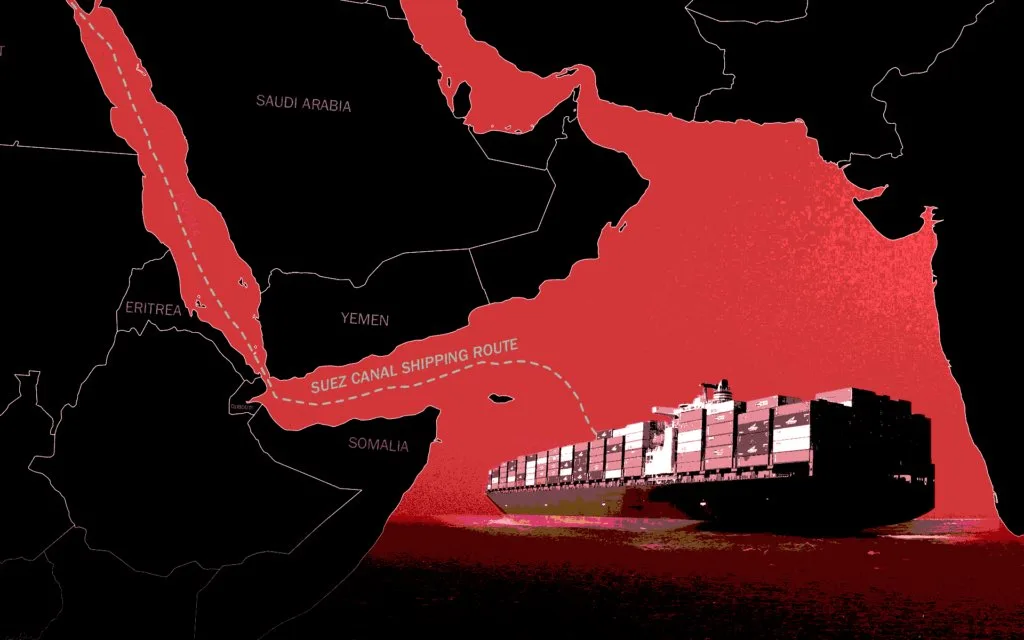Shibhaljazeera Net | Shipping | Red Sea
Military operations by the Sana’a government in the Red Sea have revealed “weak points in modern maritime trade,” according to a recent report that confirmed ongoing instability is affecting shipping efficiency and has broader economic implications across Asia, the Middle East, and Europe.
According to the report reviewed by Boqash Observatory on the “SDCExec” website, which specializes in global supply chains, transportation, and procurement, maritime trade disruptions highlight the need for new strategies to adapt supply chains and leverage advanced technologies to overcome rising risks and operational costs.
The escalating crisis in the region has forced hundreds of ships to avoid the Red Sea and choose the much longer route around the African continent, adding over a week to each journey. This results in significant increases in costs and fuel consumption, with cargo spending 30% more time on water, meaning fuel consumption for the same routes has also increased by 30%.
With longer sailing times, each ship completes fewer estimated voyages annually, thus reducing fleet capacity by 23%. More ships are required to transport the same volume of goods, increasing costs and inefficiency across the supply chain.
How Have the Attacks Affected Trade?
According to the “SDCExec” website, attacks by the Sana’a government on shipping routes in the Red Sea and surrounding areas in the Arabian Sea and the Indian Ocean have had significant impacts on global maritime shipping.
The most prominent of these impacts, as noted by Boqash, is the rise in insurance costs, as tensions have caused insurance premiums for ships crossing these waters to rise, subsequently raising the overall cost of shipping goods.
Security risks have increased along shipping lines, especially in the Bab al-Mandab Strait, which handles 10-12% of global trade, particularly for oil shipments from the Middle East to Europe and North America.
Other impacts include “potential delays,” as ships may alter their routes to avoid dangerous areas, making inspections and security checks more stringent, which increases delays in the movement of goods. Additionally, “shipping prices are affected,” as the combination of longer routes, security measures, and higher insurance costs results in increased shipping prices.
This effect can ripple across global supply chains, particularly affecting goods sensitive to shipping costs, such as oil and consumer goods.
The maritime tensions have also led to “disruptions in trade flows,” especially in energy products, and have exacerbated political and economic instability, complicating trade further.
Despite the Sana’a government’s claim of not targeting ships unrelated to Israel, companies are hesitant to engage in trade routes considered high-risk, leading to reduced traffic in affected areas and the potential for shortages of goods in certain markets.
Punitive tariffs and sanctions on strategic goods, such as advanced semiconductors, have become more common, making once-stable trade corridors undesirable or even illegal. This leads to ongoing, complex reconnections of the global supply chain, requiring redundancy in infrastructure and raising costs for shippers, carriers, and consumers alike.
The Futility of the U.S.-Led Maritime Alliance
The website argues that critics of the international maritime alliance led by Washington under the banner of protecting ships in the Red Sea are right.
It is unlikely that a purely defensive strategy will deter Yemeni attacks. Moreover, any direct military action risks escalating the regional conflict to an uncontrollable level, which could further worsen an already unstable economic situation, according to the site.
To effectively manage these disruptions, it is essential to develop flexible and adaptive supply chains rather than rigid and fragile ones.
The site believes the key to overcoming these challenges is fully leveraging advancements in supply chain management technology. Modern, adaptable systems can help connect the dots between constantly changing logistics and conflicts, ensuring better outcomes in a fast-moving world, “where the situation on the ground or at sea can change overnight,” according to Boqash’s review of SDCExec proposals.
Source: Boqash Economic Observatory
